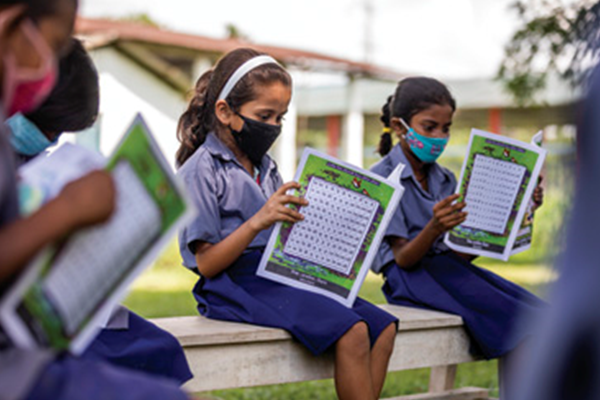 Sometimes forgotten amidst the pandemic that upended the world is a global learning crisis that forced more than 1.6 billion children out of school.
Sometimes forgotten amidst the pandemic that upended the world is a global learning crisis that forced more than 1.6 billion children out of school.
This immense loss of learning and development resulted in permanent setbacks for an entire generation – disproportionately affecting girls, according to a joint report between UNICEF, UNESCO and the World Bank.
More than 10 million girls who left school temporarily as a result of the COVID-19 lockdowns may never return. Dropping out of school can negatively impact girls for their entire lives.
In terms of child marriage, this pandemic could force 10 million more girls to marry by 2030.
Even in times of crisis, girls have an equal right to quality education and learning.
You can play a role in ensuring girls all around the world have the opportunity to fulfill their potential.
An organization like UNICEF USA has resources to help girls receive a quality education.
Advocate for the Keeping Girls in School Act
One way to take action in the fight for girls’ education is by urging members of Congress to co-sponsor and help pass the Keeping Girls in School Act.
This bipartisan act would empower girls around the world by authorizing the U.S. Agency for International Development to enter into innovative and result-based grant programs that reduce barriers adolescent girls face in receiving education.
By investing in girls’ educations, barriers such as child marriage, harassment, violence, care burdens, and negative gender norms keeping girls from long-term, quality education can be put to an end.
Evidence shows enrolling and keeping girls in school results in a positive impact on their health and economic prosperity as well as the improvement of the security of their communities and countries.
To help streamline the process, UNICEF USA’s Keeping Girls in School Act page allows you to send an email to your representative in one click.
Support Water, Sanitation and Hygiene (WASH) Programs
Accessible WASH programs can help prevent girls from missing school and falling into child labor, adolescent pregnancy, and forced marriage.
For many girls, schools provide a lifeline, offering vital information and support (on-site or through referral services) for nutrition; menstrual hygiene management; and broader psychosocial, sexual, and reproductive health needs.
Annually, UNICEF invests $1 billion in WASH programs in more than 110 countries. These funds go toward building solar-powered water pumps for communities; providing education on and products for menstrual hygiene management; equipping schools with private changing rooms, single-sex bathrooms, and handwashing stations; and more.
To learn more about how you can support these programs and help ensure every girl’s right to education is realized, visit unicefusa.org/WASHforEducation.
Become a Harlem Insider!
By submitting this form, you are consenting to receive marketing emails from: . You can revoke your consent to receive emails at any time by using the SafeUnsubscribe® link, found at the bottom of every email. Emails are serviced by Constant Contact








